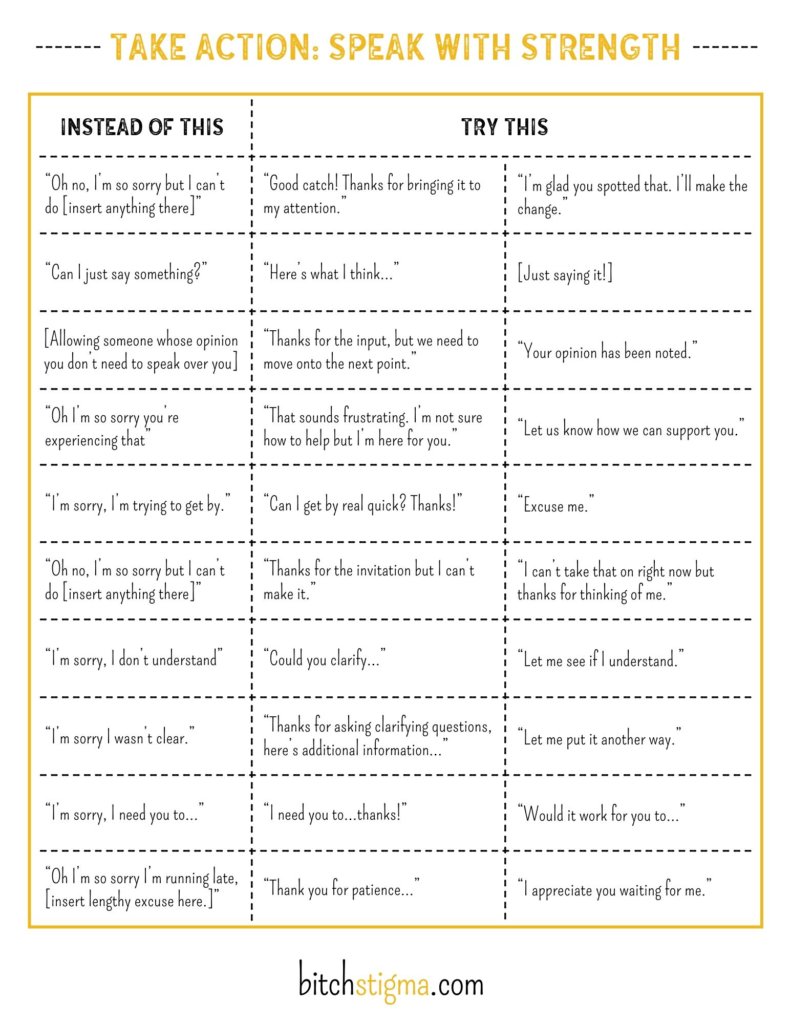Sorry, Not Sorry: Stop with the Soft Language and Speak with Strength
 Being a dominatrix gave me an incredible opportunity to practice the clear communication we’ve been talking about. It was my job to use decisive language and to turn everything into a command. With my clients, it wouldn’t be appropriate to request or ask for things. There needed to be an element of demand in every interaction.
Being a dominatrix gave me an incredible opportunity to practice the clear communication we’ve been talking about. It was my job to use decisive language and to turn everything into a command. With my clients, it wouldn’t be appropriate to request or ask for things. There needed to be an element of demand in every interaction.
But that doesn’t mean that I was rude or loud or acted like a jerk. Instead I had to imbue everything I said with a confident authority and an expectation that they wanted nothing more than to fulfill my every requirement.
It turns out that this has been a useful tool in everyday life too.
One of the most common ways the Bitch Stigma affects women is in the way we communicate. Because women are often socialized to be nice and polite, we lean on “soft language” to pad our messages and protect our audiences. But it often backfires and makes us sound unconfident and in need of reassurance.
Soft language includes things like apologizing—”Oh, I’m sorry but I just wanted to talk to you about…”—and using diminishing or minimizing phrases like, “I was just thinking…” or “Maybe we could consider…”
Before you know it, a simple request turns into, “I was thinking that maybe if you wouldn’t mind talking about some ideas that I had, of course we don’t have to do them, but…”
Our sentences become three times longer because we’re padding them with softening language. What’s worse, it’s no longer clear what we’re even saying or why anyone should care. But, of course, if we just get to the point, we fear we’ll come off as curt, bitchy, or nagging.
Here are some examples of softening language:
- Apologizing all the time
- Being sorry for simply “taking up space”
- Qualifying statements with “maybe,” “should we consider,” or “if you think we should”
- Starting all sentences with “I feel” or “I think” or “I believe”
- Starting sentences with “Can I just say something…”
- Downplaying your own knowledge with “Maybe I’m wrong, but…”
Saying “just” a lot (I was just thinking, etc.)
- Using a lot of exclamation points, speaking in a really perky way, or making everything you say sound like a question
- Frequently allowing people to talk over you
- Ending sentences with “Don’t you agree?” or “What do you think?” or “If it’s okay with you…”
Now let’s take a look at one of the biggest ones in more depth.
Sorry, Not Sorry: Stop Apologizing
In an effort to appear polite and submissive and avoid the “bitch” category, women say, “I’m sorry,” for practically everything. We apologize for taking up space. If somebody else bumps into us in the store, we apologize because we were in their way (even if we weren’t actually in their way). Even if a situation simply feels awkward—because there’s a gap in conversation or for any other minute reason—we apologize.
When we apologize all the time it appears that we’re taking responsibility for other people or for inconsequential or accidental occurrences. That’s because we are. That’s because we have been taught to do so.
We also use the phrase “I’m sorry” to express empathy rather than as an actual apology. It’s a way of acknowledging what someone else is going through when you don’t know what else to say. While this instance isn’t as much about apologizing as about expressing solidarity, it still reinforces the tendency to say “I’m sorry” in situations that don’t call for it.
In short, there’s almost always a better option than “I’m sorry.” Here are some suggestions:
- Offer a solution: Rather than focusing on a mistake that was made, skip straight to correcting it. “I didn’t include this information in the last email. You can find additional details below.”
- Shift from regret to gratitude: Instead of “I’m so sorry this is late!” say, “Thank you for your patience.”
- Focus on solidarity, if that’s what you mean: Rather than, “I’m sorry you’re going through that,” say, “That sounds so frustrating. I’m not sure how to help, but I’m here for you.”
Other phrases that can come in handy when avoiding excessive apologizing:
- Good catch, I’ll make the updates/changes.
- Thanks for bringing this to my attention.
- Excuse me, pardon me, or go ahead.
- Could you clarify…
- I have a question about…
- Thank you for the invitation, but I’m not able to make it.
- I appreciate the input, but we need to move onto the next point.
Wondering what you can replace all those I’m sorry’s and other soft language habits with? Join the Ditch the Bitch Stigma Library for a printable version of this handy-dandy sheet!

